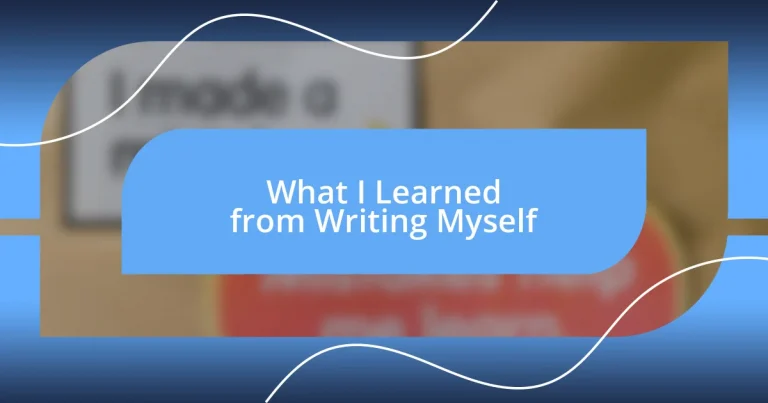Key takeaways:
- Self-reflection and writing reveal hidden emotions and patterns, enhancing self-awareness and decision-making.
- Vulnerability in writing fosters deeper connections with others and encourages personal growth.
- Sharing personal journeys through writing creates community and offers inspiration, turning struggles into empowering narratives.
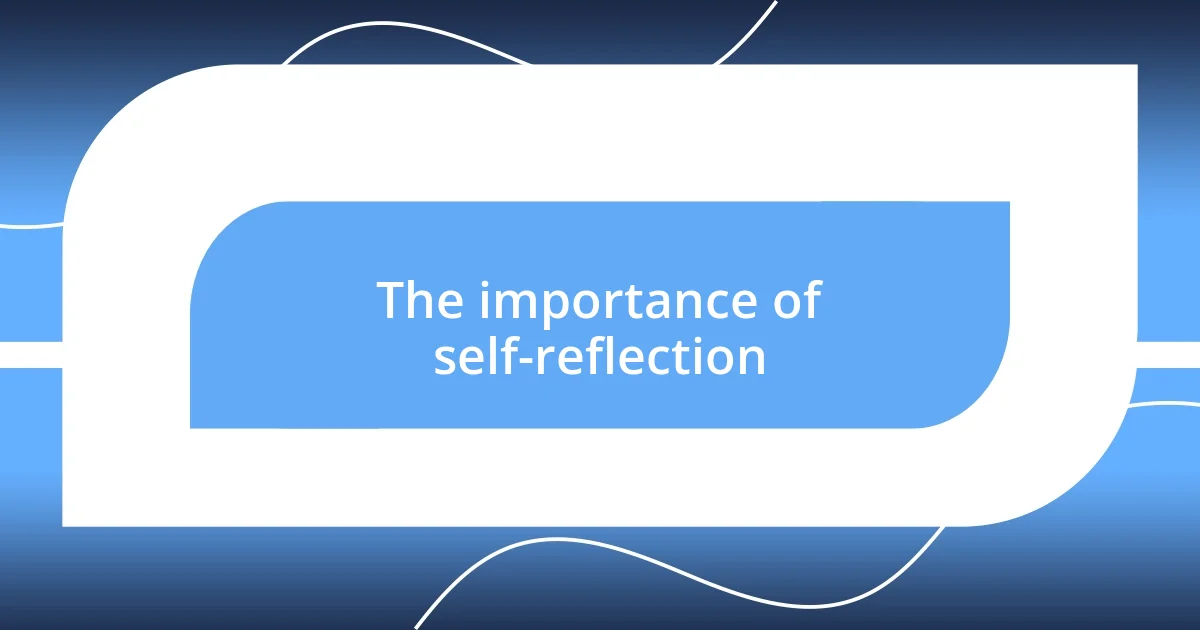
The importance of self-reflection
Self-reflection is like holding a mirror up to my experiences. I remember a time when I felt lost in my career, unsure of my next steps. Taking a moment to reflect on my achievements, failures, and aspirations helped illuminate a path forward—one I hadn’t seen before.
When I think about the moments of self-reflection that truly shook me, I recall a journaling exercise I once undertook. As I poured my thoughts onto the page, I stumbled upon feelings I didn’t even realize were weighing me down. Isn’t it fascinating how articulating our thoughts can unearth emotions we often bury?
It’s essential to carve out time for self-reflection in our busy lives. How often do we rush from one task to the next without pausing to ponder our thoughts? I’ve found that this practice not only enhances my decision-making ability but also strengthens my emotional intelligence, allowing me to engage more deeply with others.
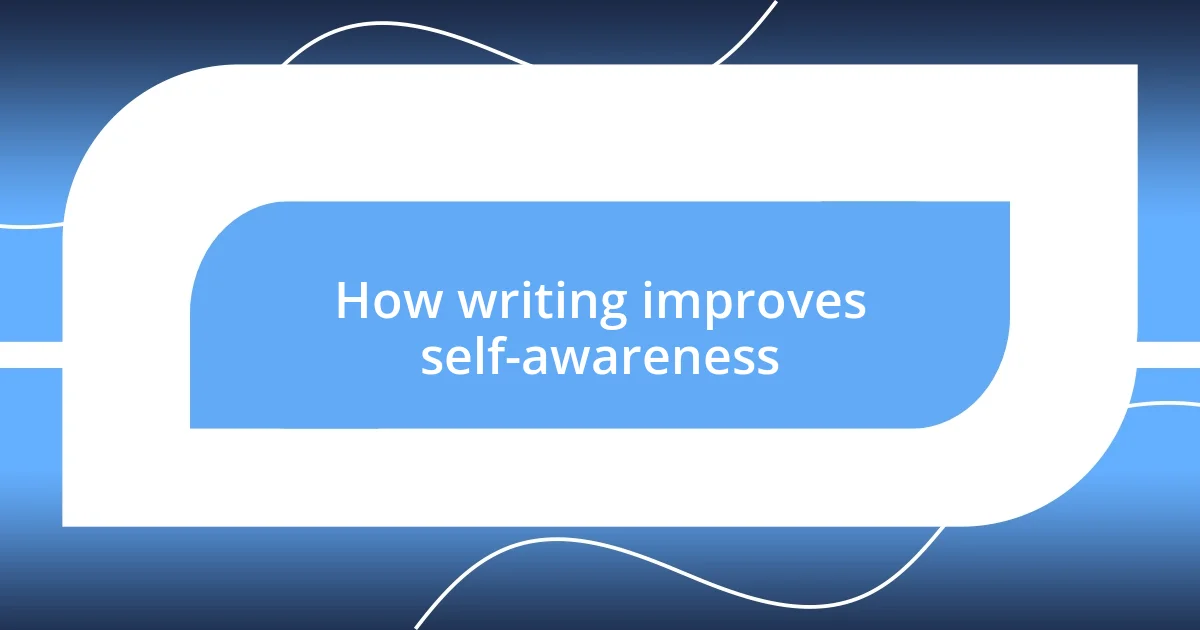
How writing improves self-awareness
Writing has a profound way of shining a light on my inner self. I recall a time I wrote a letter to my future self, detailing my dreams and fears. As I put pen to paper, I realized how often I avoided addressing my anxieties, and that exercise not only clarified what I truly wanted but also illuminated parts of myself that I had neglected.
- It encourages honesty: Writing requires me to be truthful with myself.
- I discover patterns: I often notice recurring themes in my thoughts, revealing my core values.
- It fosters growth: Assessing my past writings shows me how far I’ve come and where I need to go.
- I gain perspective: Detailing my experiences helps me step back and see the bigger picture.
- It cultivates mindfulness: Writing forces me to slow down and fully engage with my feelings.
In those moments of literary introspection, I’ve uncovered aspects of my personality I didn’t even know were there. One particularly eye-opening instance was when I wrote about my relationships and how my past choices influenced them. By articulating my thoughts, I was able to see my relationship patterns more clearly, prompting me to make healthier choices moving forward. This revelation was like finding a hidden treasure—it opened new doors of understanding about who I am and how I connect with others.
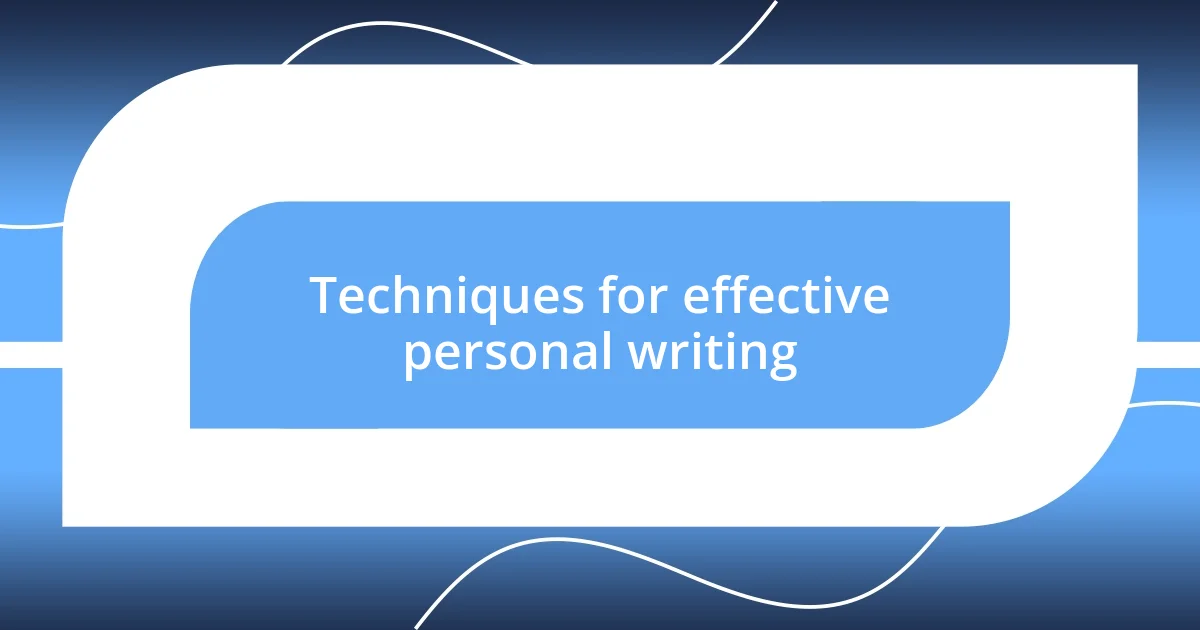
Techniques for effective personal writing
Effective personal writing hinges on the ability to express emotions candidly. I’ve noticed that when I write about moments that hurt or stirred my joy, the words flow more freely. For instance, the day I penned my first poem after a breakup turned out to be cathartic; I found solace in the vulnerability. Capturing my feelings not only allowed me to process them but also helped me connect with readers who might have faced similar experiences.
Another technique that truly enhances my writing is storytelling. I often weave narratives from my life into my writing to engage readers fully. One memorable story I recounted was about the confidence boost I felt after delivering my first public speech. By diving into the nerves before stepping onto the stage, I could convey palpable emotions that resonated with others facing their own fears. It’s like inviting readers into a vivid experience, one they can relate to and learn from.
Lastly, establishing a routine can make a world of difference. I’ve found that writing at the same time each day not only builds discipline but also prompts my creativity to flow more naturally. On days when I sit down with my morning coffee and journal, I often uncover deeper insights about my goals and aspirations. This structured practice reinforces my personal development, allowing me to explore thoughts I might not tackle in busier moments.
| Technique | Description |
|---|---|
| Emotional expression | Writing about genuine feelings facilitates healing and connection. |
| Storytelling | Narratives are powerful tools that engage readers on a personal level. |
| Routine | Consistent writing practice enhances creativity and self-discovery. |
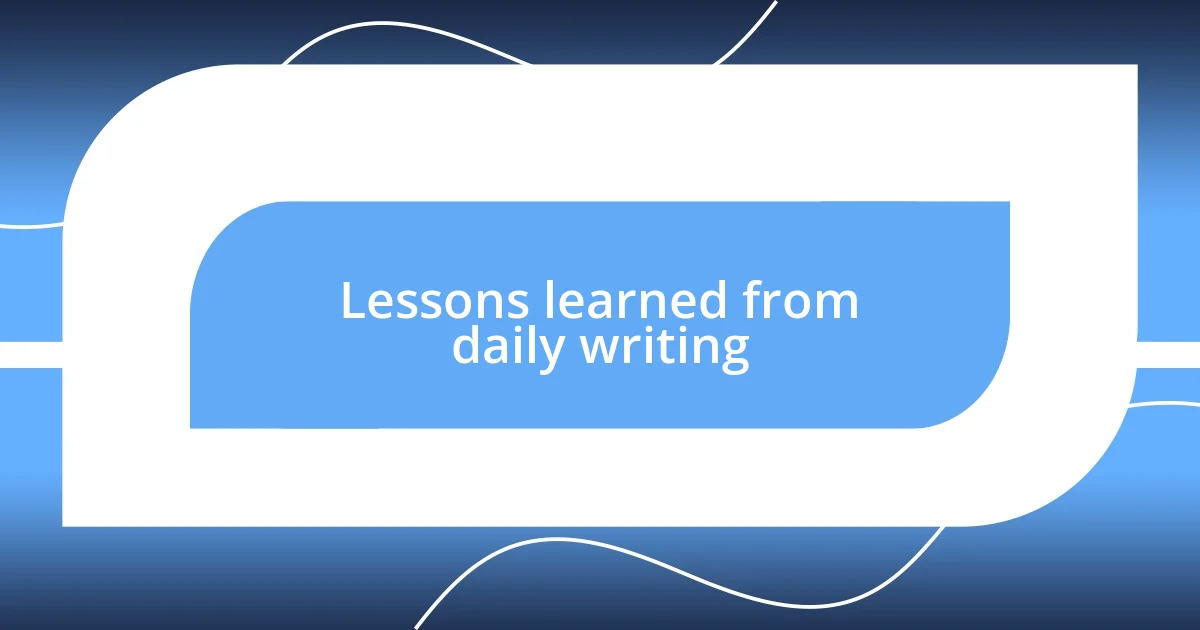
Lessons learned from daily writing
When I think about the lessons I’ve learned from daily writing, one stands out: the power of vulnerability. One evening, I decided to write about a time I felt utterly lost, full of fear and doubt. As I poured those raw emotions onto the page, I was surprised by how liberating it felt. It made me realize that sharing genuine struggles can foster a deeper connection with others. Have you ever found that vulnerability opens unexpected doors?
Writing daily has also trained me to recognize patterns in my thoughts and emotions. For instance, I once tracked my feelings over a month, and I noticed how often I spiraled into anxiety whenever I faced deadlines. By identifying this pattern, I began to implement mindfulness techniques, like deep breathing and scheduling breaks. It’s fascinating how putting thoughts on paper can lead to such powerful realizations. Don’t you think it’s incredible how self-reflection can lead to practical changes in our lives?
Sometimes, I find that hindsight is a wonderful teacher. Going back to read past entries can be like revisiting an old friend. I remember a time when I reflected on how a significant failure impacted my direction in life. What struck me was not just the failure itself, but the resilience I discovered in navigating through it. Each entry highlighted my growth journey, reminding me of how far I had come. Isn’t it amazing how writing can serve as a roadmap of our evolution?
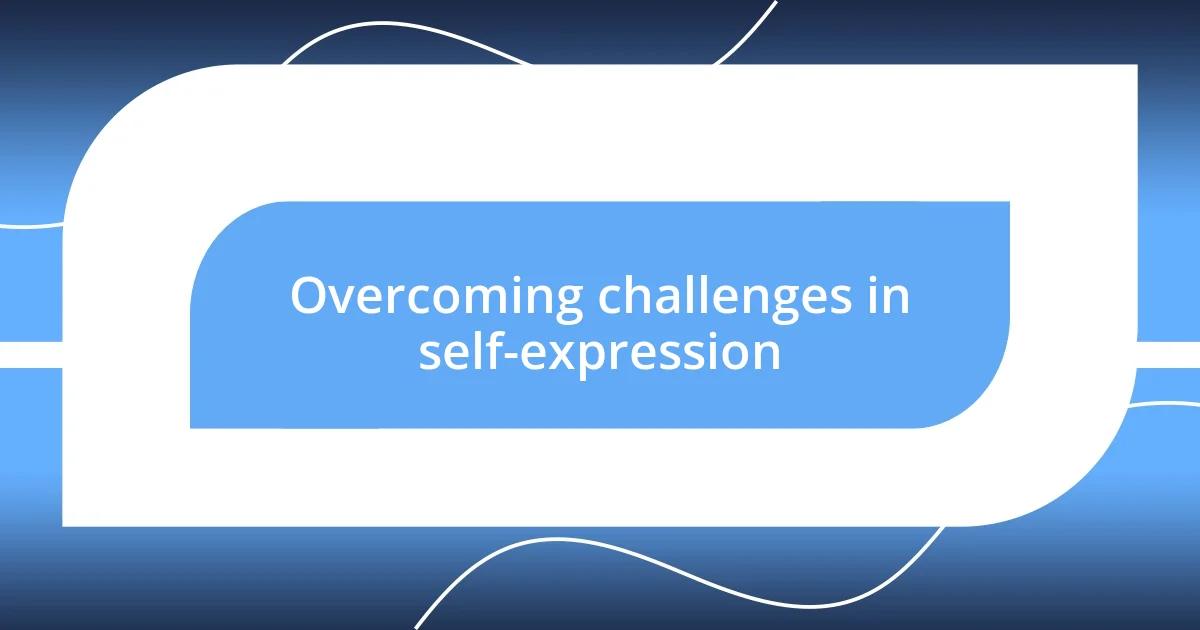
Overcoming challenges in self-expression
Self-expression often feels like climbing a mountain. There are days when sharing my thoughts feels effortless, but there are times when the weight of my emotions makes it hard to put pen to paper. I remember a period when I struggled to articulate my thoughts about a personal loss; writing felt like wading through thick fog. What I discovered during that time is that the act of writing itself can be a pathway out of that fog, leading me toward clarity.
One memorable challenge was confronting my fear of judgment. I often hesitated to share my pieces with others, worried about their reactions. However, I eventually learned that vulnerability could become a strength rather than a liability. When I finally decided to share a deeply personal essay about my anxiety, the responses were overwhelmingly supportive, forming connections I never anticipated. Have you ever worried about opening up, only to find that others relate more than you thought?
Another significant hurdle was understanding the difference between raw emotion and crafted expression. Initially, I poured my feelings onto the page without structure, which sometimes led to chaotic writing. Over time, I learned that finding a balance between honesty and coherence could enhance my message. One time, after revising a particularly jumbled piece, I realized how refining my words allowed me to convey emotions more powerfully. It felt like capturing fireflies in a jar, illuminating my experience in a way that others could appreciate. Isn’t it remarkable how honing our craft can elevate our self-expression?
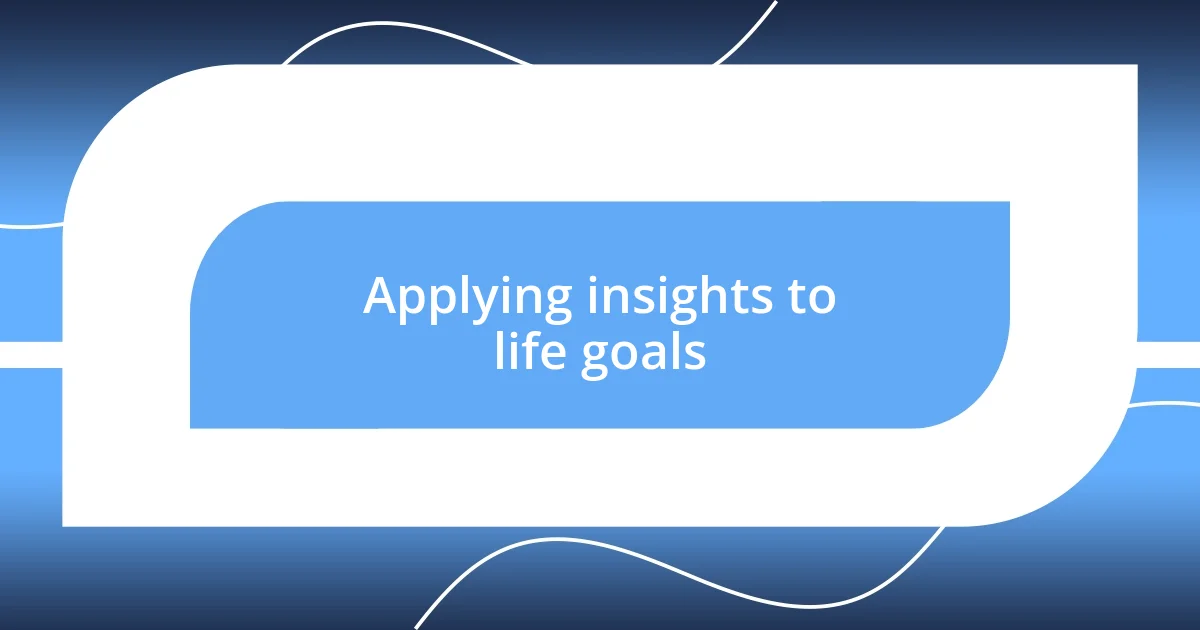
Applying insights to life goals
Reflecting on insights from my writing journey has profoundly shaped my life goals. For example, after realizing how consistently journaling ignited my creativity, I set a target to explore creative avenues, such as painting and music. Isn’t it interesting how a simple habit can influence the direction of our ambitions?
One day, I found myself writing about the importance of balance in my life, particularly the need to prioritize joy amidst responsibilities. This led me to create a bucket list filled with activities that genuinely excite me, from hiking to trying new recipes. I never would have considered these joyful pursuits as life goals if I hadn’t taken the time to reflect on what truly resonates with me.
When I hit a significant milestone, like completing a challenging writing project, I always document my feelings of accomplishment. These records serve as reminders of my progress and motivate me to set even bolder goals. It’s like mapping out a personal victory lap, reminding me that celebration can fuel future aspirations. Don’t you find that tracking achievements can create a clearer vision for the next steps?
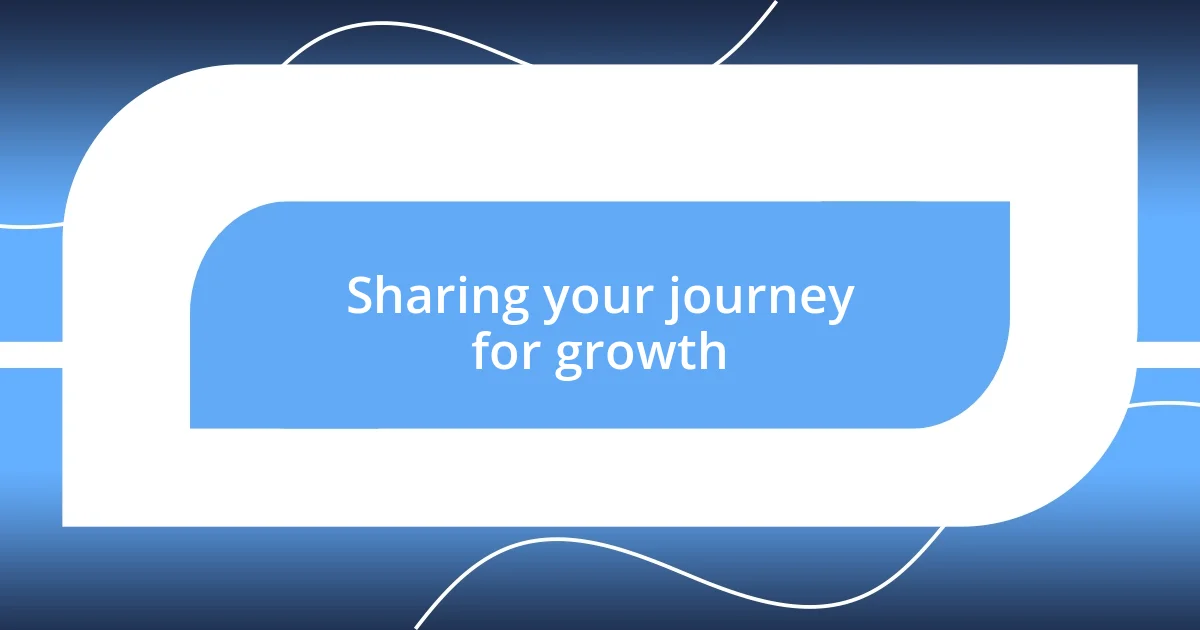
Sharing your journey for growth
Sharing my journey of self-discovery through writing has been nothing short of transformative. There was a time when I decided to post snippets of my work on social media, thinking I’d only get a few likes from friends. To my surprise, countless strangers reached out to share their own stories, revealing how my words resonated with their experiences. Isn’t it fascinating how opening up can create a community of shared growth where I initially expected solitude?
Moreover, each time I share a piece of writing, it’s as if I’m shedding an old layer of myself. I recall one instance where I wrote about my struggles with self-identity and published it in a local magazine. The feedback I received wasn’t just supportive; it prompted deeper conversations with my peers and even my family. Have you ever thought that sharing your struggles could not only help you but also inspire others to embark on their own journeys of growth?
What I’ve come to understand is that sharing sometimes feels like standing on a diving board, teetering between vulnerability and fear. Yet, the moment I leap and share my work, I experience an exhilarating mix of relief and empowerment. Each response ignites a spark, urging me forward on my path. I often wonder—what if my next story can empower someone else to embrace their own journey?












